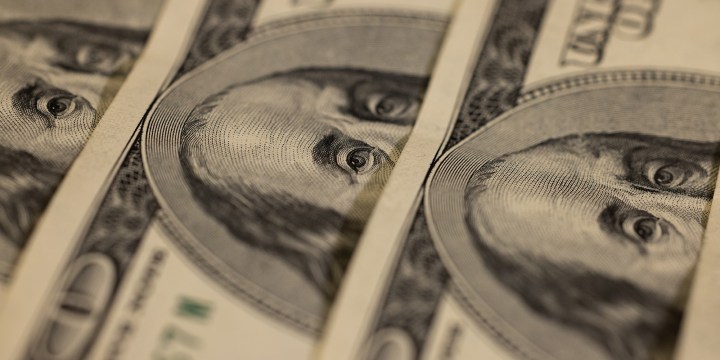ISS TODAY OP-ED
Counterfeit currency raining on DRC as lucrative money-spinner for organised crime

The DRC is an origin, transit and destination country for counterfeit currency, most of which is US dollar-denominated.
In February 2021, Ugandan police arrested eight people — most from the Democratic Republic of the Congo (DRC) — in a Kampala suburb. They were found with $2.4-million worth of counterfeit United States (US) dollars ready for circulation in Uganda and the region. In January 2023, Uganda Revenue Authority officers arrested a Congolese trafficker concealing fake dollar bills worth $500,000 in his luggage.
The circulation of forged banknotes is endemic in most African countries. An Interpol liaison officer who requested anonymity said only about two cases were reported in the DRC annually — a highly inaccurate reflection of the crime’s magnitude in the country.
Evidence suggests that the DRC is an origin, transit and destination country for counterfeit currency, most of which is US dollar-denominated. The crime is perpetrated by networks operating in the underground economy with transnational links to other African countries.
Counterfeit notes are produced in the DRC and in neighbouring countries, from where they are smuggled into the DRC. Distribution patterns are influenced by counterfeiters’ sophistication levels, distribution networks and techniques used to introduce the money into circulation. Criminals often target local markets or small businesses engaging in frequent cash transactions. Vendors, especially those lacking awareness or equipment to identify counterfeits, may unknowingly accept the notes.
Counterfeiters also focus on high-traffic areas and commercial outlets in neighbouring countries such as Rwanda and Uganda. They exploit porous borders and travel by road to evade detection. Informal cross-border trade in the war zone in east DRC also enables the crime, as does weak law enforcement capacity.
Organised crime networks use fake cash to fund illicit activities, including human and drug trafficking and even terrorism. In 2021, the Congolese National Police recovered AK-47 rifles, fake US dollars and equipment used for forgeries from four suspects in Bukavu.
The primary producers of counterfeit dollar bills in the DRC work with syndicates in East and Central Africa to funnel the banknotes into the legal economy through mineral trading and other commercial activities in DRC. They target unsuspecting people in the informal economy, offering to exchange fake currency for legitimate currency at a favourable rate.
Signs of forged money include serial number discrepancies on the note, poor-quality colour, a lack of security features and low-grade paper. However, these characteristics are usually only detectable by law enforcement agents, formal businesses with screening technology, or those familiar with the security features of authentic notes. According to the Interpol officer, the general public was largely unaware of the presence, much less the signs, of fake currencies.
Dollarisation fuelling counterfeiting
The counterfeiting and circulation of US currency across the DRC is exacerbated by the dollarisation of the country’s economy. US dollars are accepted everywhere and used for most major purchases. The Congolese CFA has been abandoned in most parts of the country, after it was devalued due to the extended civil conflict in the 1990s. Hyperinflation led to the US dollar being introduced as the legal tender, and about 90% of assets in the banking system are denominated in US dollars.
According to a report by the Action Group against Money Laundering in Central Africa, this dollarisation is entrenched by a 2001 law aimed at regulating transactions in national and foreign currencies in the DRC. The law guarantees the unrestricted settlement of transactions in foreign currencies.
For any country, the effects of having counterfeit notes in circulation are damaging. Fake cash diminishes the worth of genuine money and can lead to inflation, which burdens consumers with higher prices for goods and services. Companies also suffer substantial monetary losses when goods and services are paid for with forged banknotes.
Read more in Daily Maverick: South Africa’s illicit trade problem is out of control – but there’s still time to turn this Titanic around
The Action Group against Money Laundering in Central Africa report confirms that investigations and prosecutions have been launched into activities associated with money laundering, including counterfeiting currency. However, details about the outcomes of these legal proceedings are lacking.
Preserving the integrity of both local and foreign banknotes in the DRC is the responsibility of the Central Bank, which can adapt lessons from other regions on how to proceed.
Information and training on the security features of banknotes are needed for law enforcement and business. The Central Bank must lead in promoting public awareness on how to differentiate between real and fake US dollar notes, and what to do when they come across them.
To stay ahead of counterfeiters, continuous investments in new technology are also vital. So too is bolstering the capacity of police, financial investigation units, prosecutors and the judiciary to expedite the prosecution of offenders. Collating relevant and accurate data is an important part of the response. Collectively, these measures would send a strong signal to organised criminal groups and citizens that the state is taking concerted action.
Central and East African countries must attend to the cross-border dimensions of the crime, by improving surveillance and partnerships between law enforcement agencies. Sustainable solutions also require the DRC authorities to control inflation, with a view to reversing the normalisation of the US dollar as the country’s legal tender. DM
Oluwole Ojewale, Enact Regional Organised Crime Observatory Coordinator – Central Africa, Institute for Security Studies (ISS).
Enact is funded by the European Union and implemented by the Institute for Security Studies in partnership with Interpol and the Global Initiative against Transnational Organized Crime.
First published by ISS Today.

















Comments - Please login in order to comment.